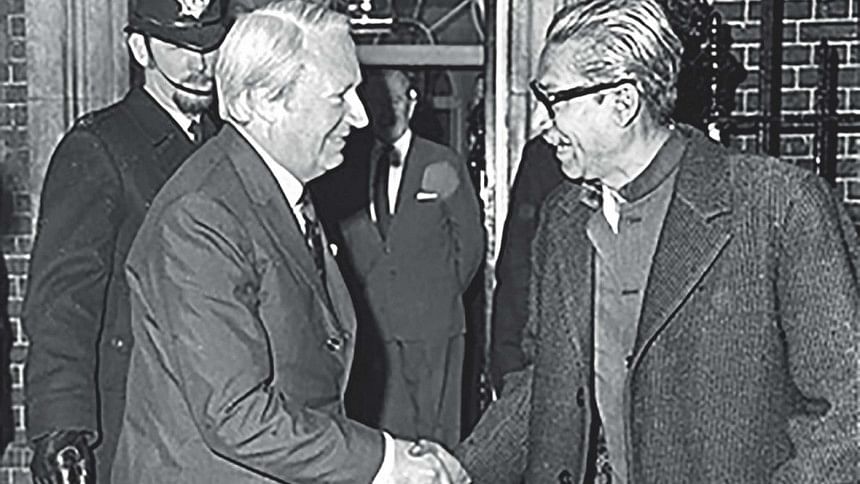At 50, Bangladesh is a land of opportunities and promise

I am delighted to be returning to Bangladesh in its Golden Jubilee year, and I look forward to celebrating the tremendous achievements of the past half century with friends old and new. Two weeks ago in London, Prime Minister Sheikh Hasina described Bangladesh at 50 as a "land of opportunities and promise." I could not agree more. I also agree that the time is ripe for us to reset and renew the Bangladesh-UK bilateral relations. The ties between our two countries have evolved through our history, and today, as we work as equal partners across the breadth of our interests, I am confident that our partnership will continue to flourish over the next 50 years and beyond.
I cannot look forward without reflecting on the momentous events of 1971. I join my friends here in honouring the memory of those who sacrificed their lives in service to the founding ideals of Bangladesh, and the promise of democracy and freedom enshrined in the constitution for those who had lived without them for so long. I know that when Sheikh Mujibur Rahman arrived in London on January 8, 1972 as the leader of a free Bangladesh, the excitement and optimism were palpable. Our then prime minister, Edward Heath, knew that this was a historic moment, and welcomed Bangabandhu to 10 Downing Street the same day. Later, our Royal Air Force flew him home to greet a newly-liberated country.
Today, the world looks on with admiration at what Bangladesh has achieved in its first half century: the fastest-growing major economy in Asia before Covid-19; a leading contributor to peace and security, especially as a provider of troops to UN peacekeeping missions; and one of the most influential global voices on climate change, as we have just seen at the UN Climate Change Conference (COP26) in Glasgow, Scotland. Over the next few days, I will listen to my friends here in Bangladesh, and will set out my aspirations for our ever-closer cooperation in future, including on trade, security and the democratic principles that the father of the nation, and so many others, fought for in 1971.
Bangladesh's landmark graduation from the Least Developed Country (LDC) status, due in 2026, highlights our shared interests in each other's prosperity. We can take this forward together through our new UK-Bangladesh Trade and Investment Dialogue. We have much to build on: the UK is currently the third-largest destination for Bangladeshi exports and the second-largest cumulative investor in Bangladesh. We have committed to providing Bangladesh with duty-free, quota-free access to the UK market until 2029. I look forward to identifying and encouraging more innovative investment in both directions.
With more efforts to improve free and fair trade between our countries, I believe we can continue to grow our economic ties. The UK is a world leader in finance, health and education services—all of which will become more important in supporting Bangladesh's future prosperity. There is a particular opportunity for UK universities to provide world-class higher education to young Bangladeshis, as they already do through partnerships in Malaysia and Sri Lanka.
Educating girls is one of the smartest investments we can make to fight poverty and save lives. This week, I will announce new UK government support for education in Bangladesh, to ensure equitable access and learning for all children, especially girls, which can contribute to Bangladesh's continued economic growth.
We work together closely on security issues, including counter-terrorism, maritime and aviation security, and through our shared peacekeeping operations around the world. I was delighted that Royal Navy frigate HMS Kent visited Bangladesh last month as part of the first deployment to the Indo-Pacific region of the UK's new aircraft carrier, which has been working and exercising alongside nations across the Indo-Pacific region. I am also very happy that, as a dialogue partner, we will be able to support the Indian Ocean Rim Association's important work under Bangladesh's forthcoming presidency. Its efforts at ensuring that the Indian Ocean's economic potential is harnessed in an inclusive and sustainable way should also contribute to good governance and maritime security.
We also work together closely on the Rohingya refugees crisis, a situation that I continue to find desperately sad. I am concerned to hear about increasing violence and insecurity for those living in and near the camps, and call on everyone in the international community to work together on a solution that will allow the Rohingyas to return to their homes as soon as possible, in a way which is safe, dignified and voluntary. We will continue to work with the Bangladesh government to support the Rohingyas for as long as necessary, and have already provided over GBP 320 million to the humanitarian response.
We work together closely on climate issues, and last week at COP26 we announced GBP 120 million of new funding for climate action in Bangladesh over the next six years. This will help turn our pledges in Glasgow into a reality on the ground, by scaling up adaptation in some of the most vulnerable communities, expanding renewable energy options, and tackling pollution and waste.
All of this is possible because of our deep links and shared history. The 600,000-strong British-Bangladeshi diaspora plays a vibrant role in UK politics, arts, cuisine, healthcare, and education. People are at the heart of our relationship. And it is people I look forward to celebrating while I am here this week.
Congratulations to everyone in Bangladesh on your Golden Jubilee. I hope you will join me in looking forward to many more years of #BritBanglaBondhon.
Lord Tariq Ahmad of Wimbledon is the UK government's minister of state for South Asia and the Commonwealth, and the UK prime minister's special representative on preventing sexual violence in conflict.

 For all latest news, follow The Daily Star's Google News channel.
For all latest news, follow The Daily Star's Google News channel. 



Comments